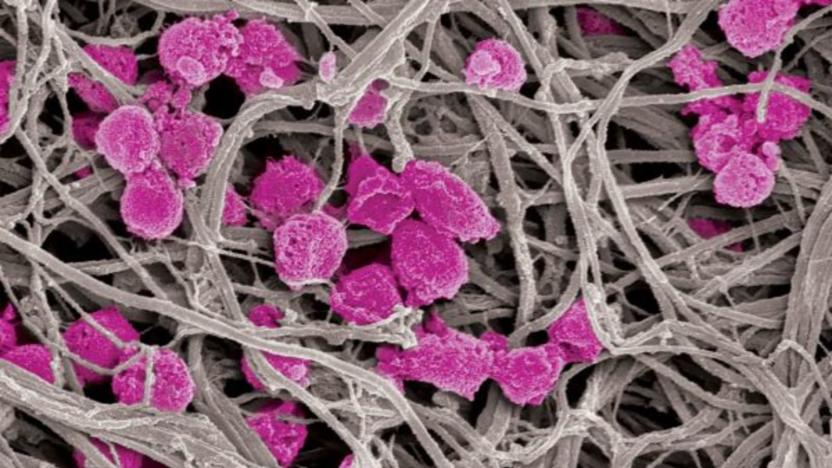chemotherapy
Latest

Scientists design 'decoy platelets' that reduce risk of blood clots
Heart disease, stroke, sepsis and cancer are incredibly serious conditions which together cause the greatest number of deaths around the world. They're unique illnesses, but they have something in common -- they're all associated with activated platelets, which play an important role in healing, but for some can also contribute to dangerous blood clots and tumors. Now, scientists think they've found a way to mitigate the risks associated with these platelets, thereby "outsmarting" the catalyst for these diseases.

Researchers use sperm to deliver cancer drugs to tumors
Chemotherapy has a lot of terrible side effects and that's partly because the drugs being used to fight cancer also attack healthy cells. Figuring out a way to deliver drugs to tumors without affecting healthy tissue is a challenge and a problem that researchers are trying to solve. One group working on this problem, New Scientist reports, is a team at the Leibniz Institute for Solid State and Materials Research Dresden and in a recent study, they showed that sperm could be turned into an effective drug delivery tool.

Snail venom provides a new way to treat chronic pain
The Conus regius' venom is bad news for its prey, and it's been proven harmful to humans as well. For instance, a 2009 clinical case describes a diver who had trouble moving his arm for 12 hours after an attack. However, scientists from the University of Utah see hope in the ocean dweller's powerful venom. In fact, research suggests it could be used to develop a new treatment for chronic pain.

ICYMI: Squashing brain cancer and autonomous drones arrive
try{document.getElementById("aol-cms-player-1").style.display="none";}catch(e){}Today on In Case You Missed It: The Airobotics drone system can autonomously launch UAVs and perform basic maintenance, like swapping out batteries. Researchers designed a device that agitates bubbles in the blood to get more chemotherapy into the brain by using ultrasonic waves. And Game of Thrones fans might want to see this Night King carved from fruit. As always, please share any interesting tech or science videos you find by using the #ICYMI hashtag on Twitter for @mskerryd.

Ultrasound implant can help chemo drugs reach brain tumors
One of the biggest problems with brain cancer treatment is that only a limited amount of chemotherapy drugs make it through. See, our brain's blood vessels are tightly lined with cells to keep out toxins and pathogens. The bad news is that it also hinders medicine from reaching tumors. A team of French scientists have recently tested a promising answer to that issue: an ultrasound implant that they designed to temporarily make this "blood-brain barrier" permeable. They ran a pilot with 15 patients suffering from glioblastoma, an aggressive form of brain cancer, and results showed that their technique successfully allowed more medicine to pass through.

Researchers use ultrasound to activate cancer-killing drugs
Since your liver is surrounded by delicate blood vessels and bile ducts, cancers are tough to treat with toxic chemotherapy drugs and usually require surgery. However, researchers from the University of Illinois have pioneered a new "triple attack" treatment that kills cancer cells with a standard lymphoma chemo drug. "Nanobubbles" of it are injected into a cancer mass, then "popped" using ultrasound, releasing medicine directly into cancer cells during critical cell formation. "The probability of its undesired systemic release is minimal due to this highly selective activation mechanism, which helps to spare the healthy cells," says lead researcher Dipanjan Pan.

Antimicrobial silver coatings could be hindering your chemo
Hospitals around the world use a silver coating on their chemotherapy equipment, such as IV catheters, because the noble metal prevents microbial growth. However, it turns out that this germ killing coating could be damaging chemo drugs that flow over it and harming patients. A team of researchers from the Norwegian University of Science and Technology's (NTNU) Department of Physics revealed this effect in a study recently published in the journal 2D Materials. "We wanted to find potential problem sources in the tubes used in intravenous catheters...Chemotherapy drugs are active substances, so it isn't hard to imagine that the medicine could react with the silver," Justin Wells, associate professor of physics at NTNU, said in a statement.

Startup's headset will bathe your brain in ultrasound, might help fight cancer, too
The scientific community has spent a decade exploring ultrasound as a means of breaking through the blood-brain barrier -- a layer of tightly-packed cells that surround the brain's blood vessels, making it difficult for doctors to deliver chemotherapy and other treatments to cancer patients. Thus far, though, most ultrasound-based techniques have relied upon complex and often costly equipment, including MRI machines and infusion pumps. But researchers at a startup called Perfusion Technology think they may have come up with a less invasive, more cost-effective alternative -- a new headset designed to deliver low-intensity ultrasound therapy to the entire brain over the course of extended treatment periods. This approach differs markedly from most other methods, which typically target smaller areas of the brain with high-intensity ultrasound doses. As with most other potential breakthroughs, however, Perfusion's technique still needs to undergo some major testing. The company has already conducted several tests on animals, but the last time a similar method was tried on humans, many subjects ended up suffering from excessive bleeding. And that doesn't sound good at all.







